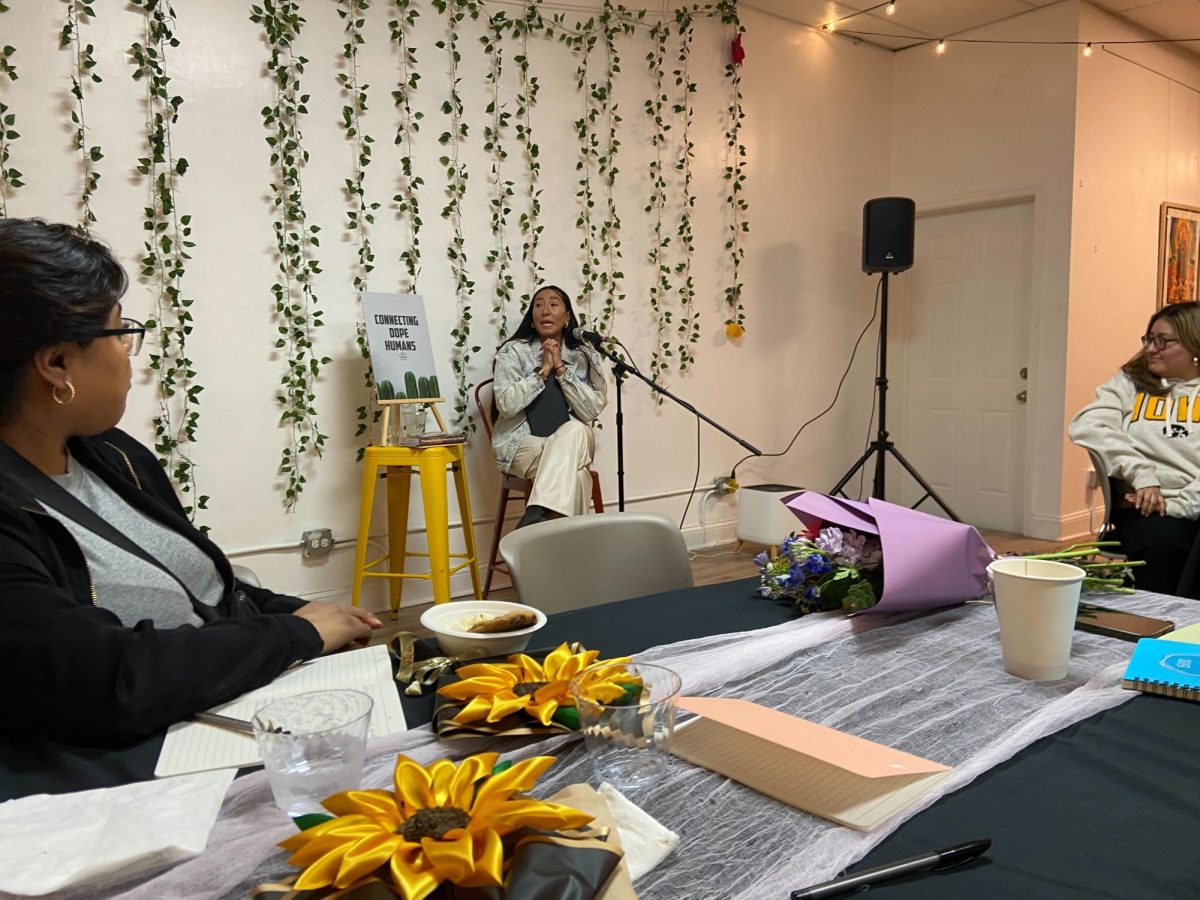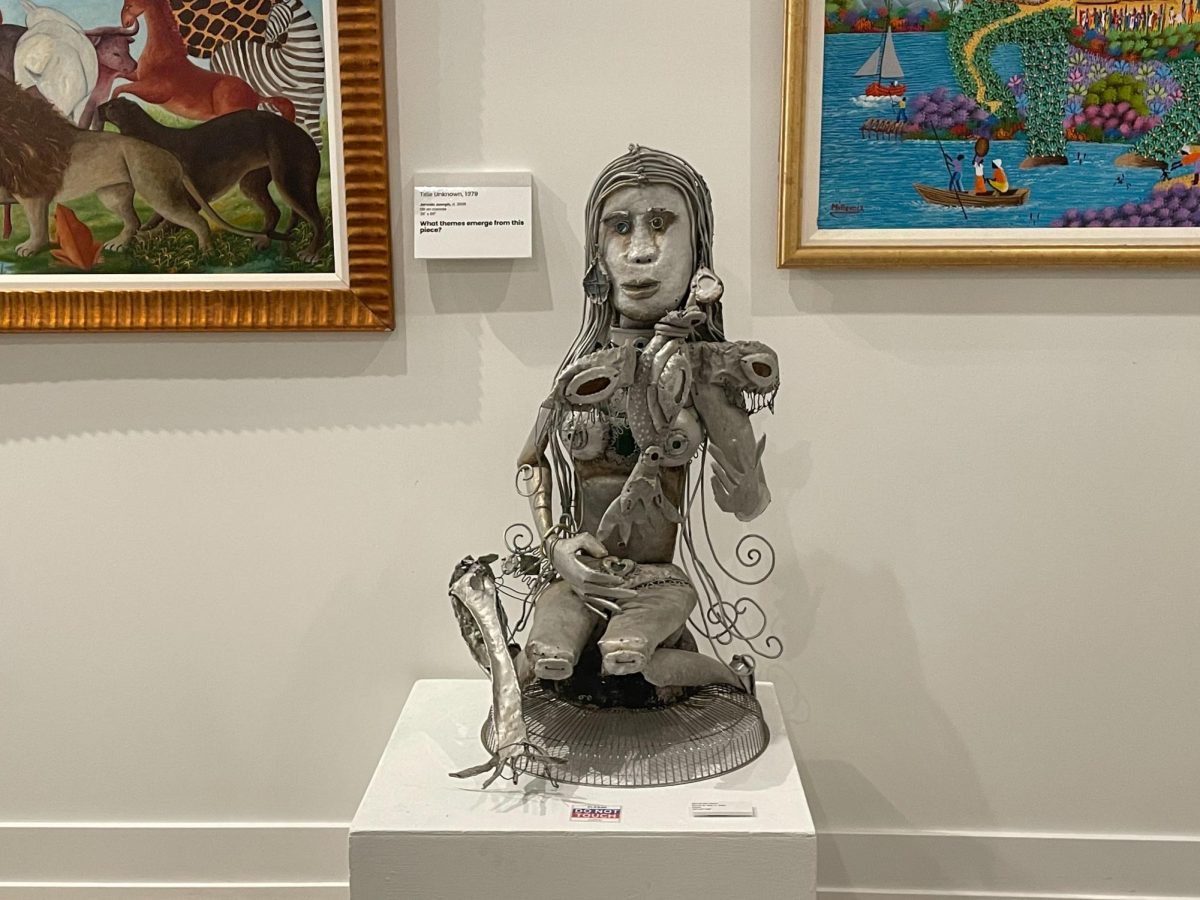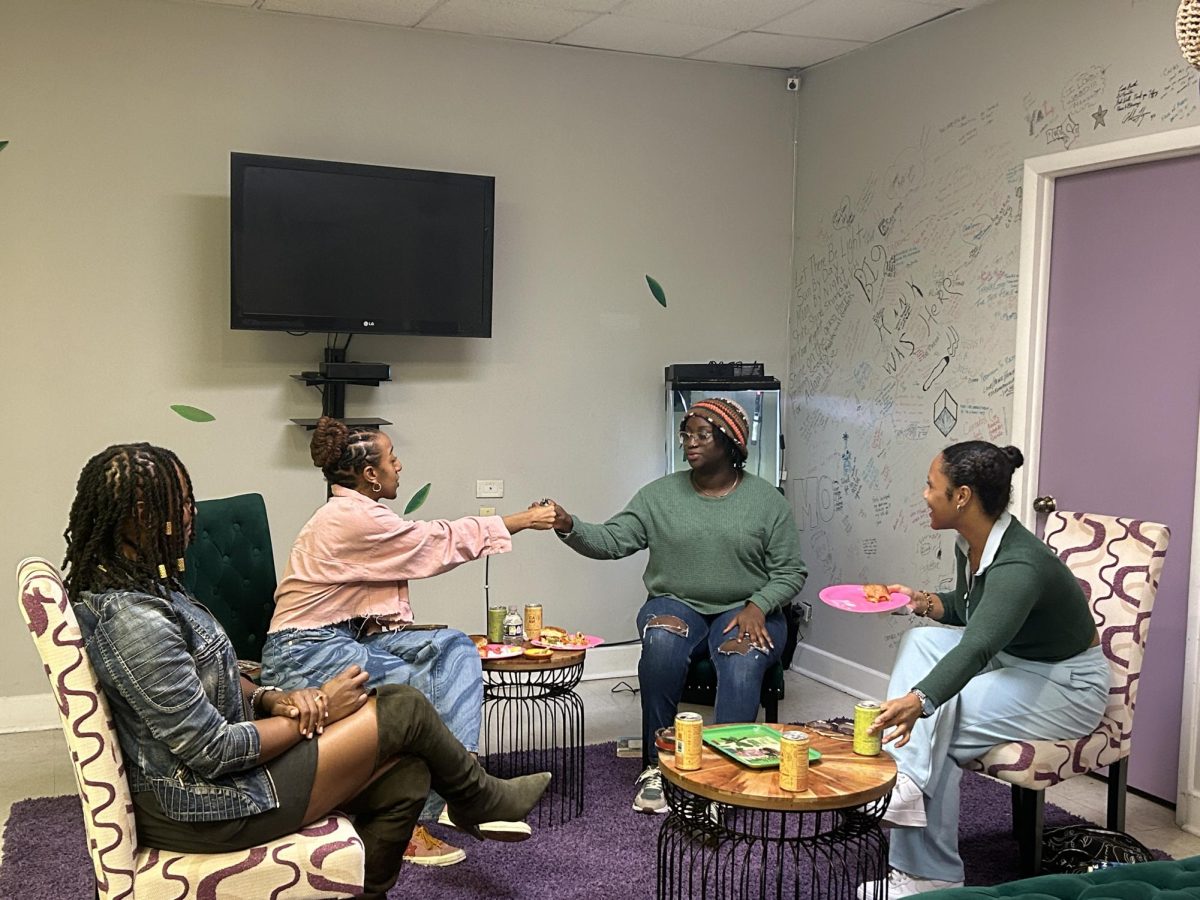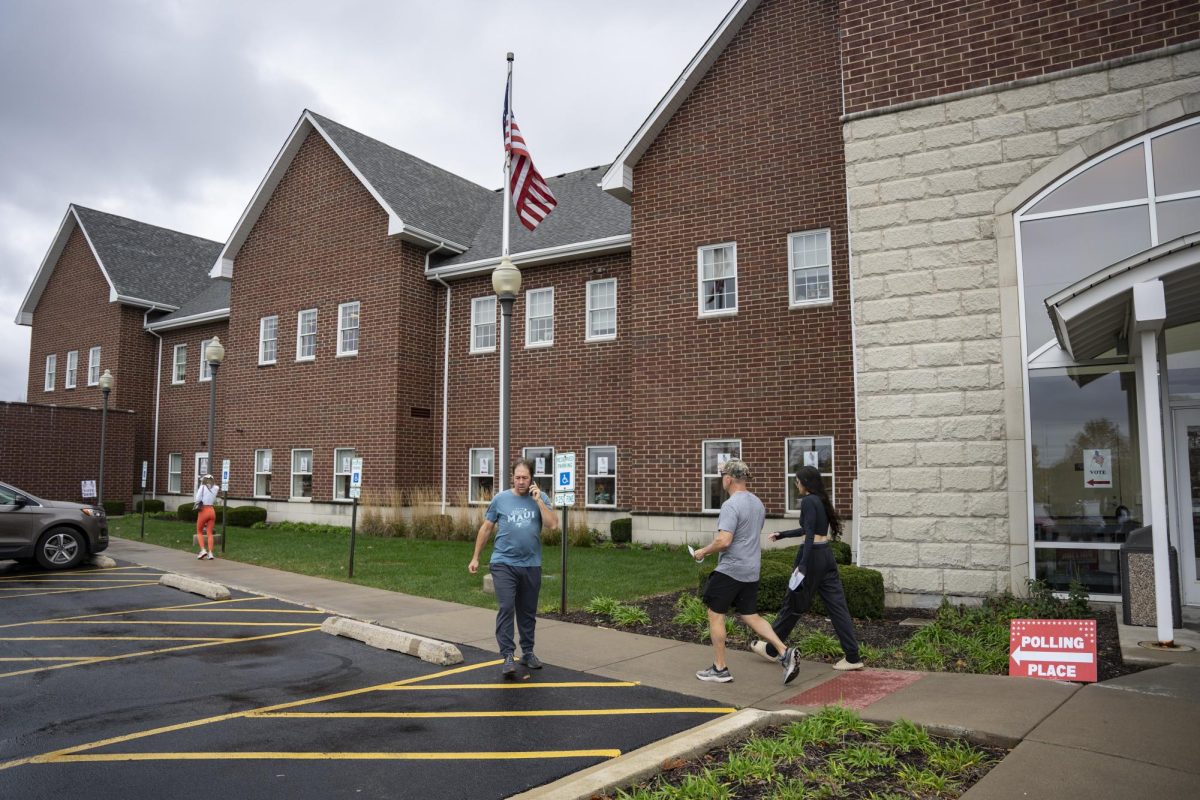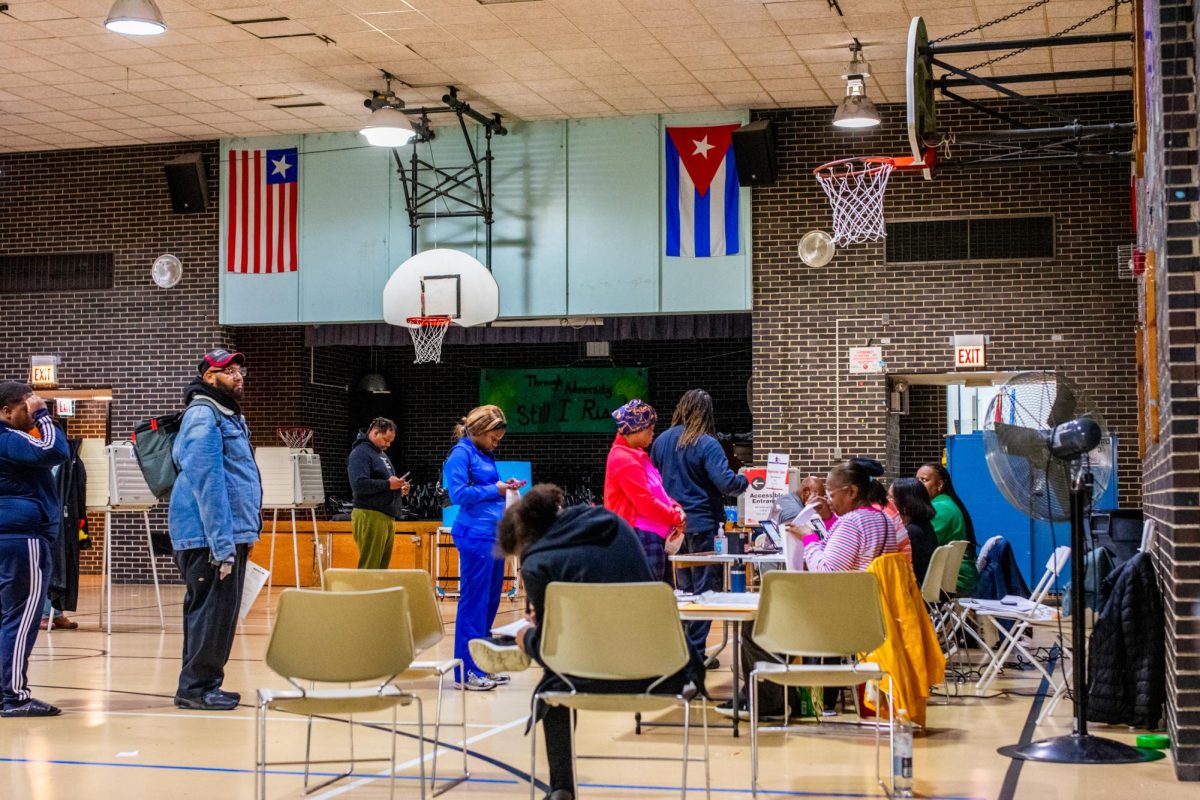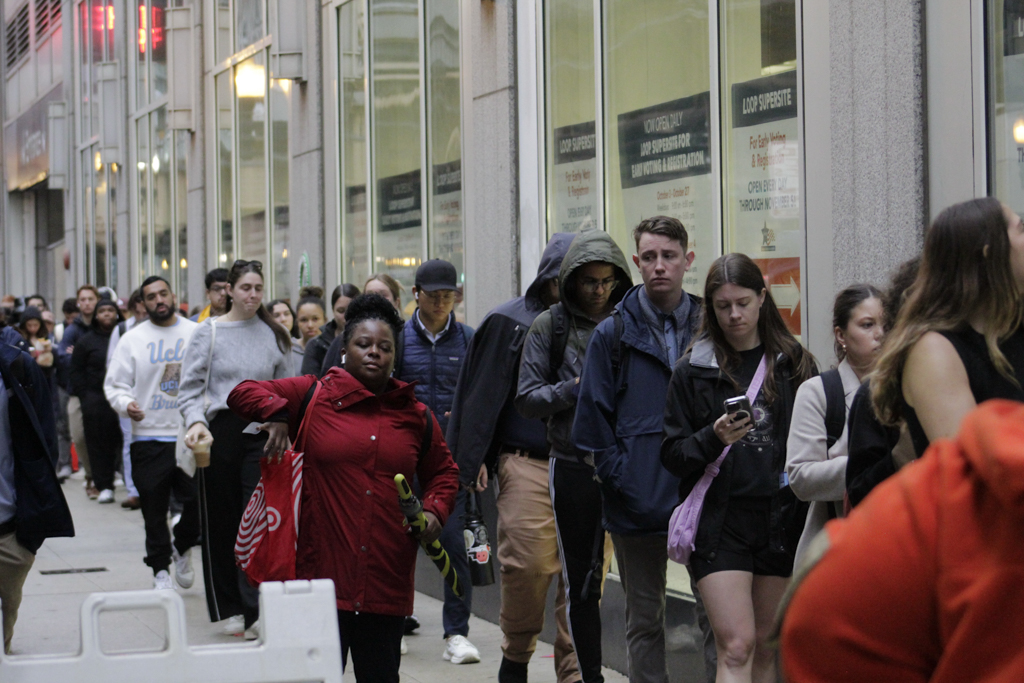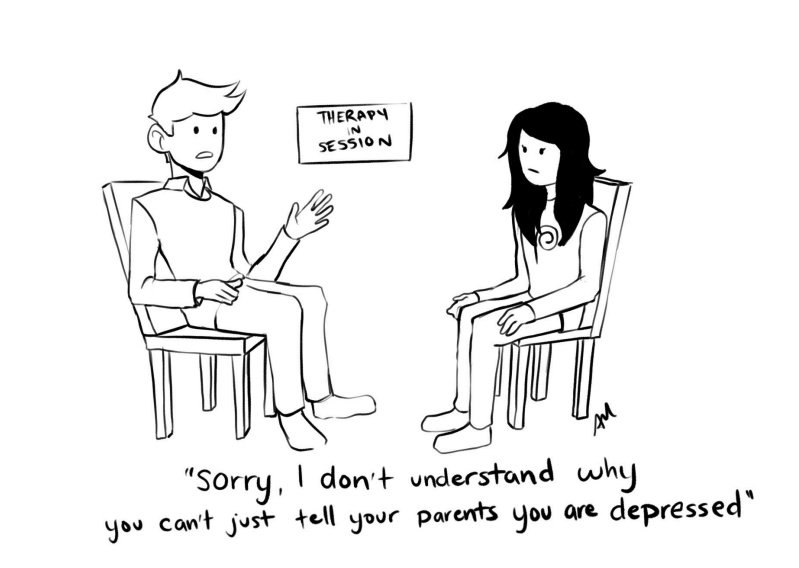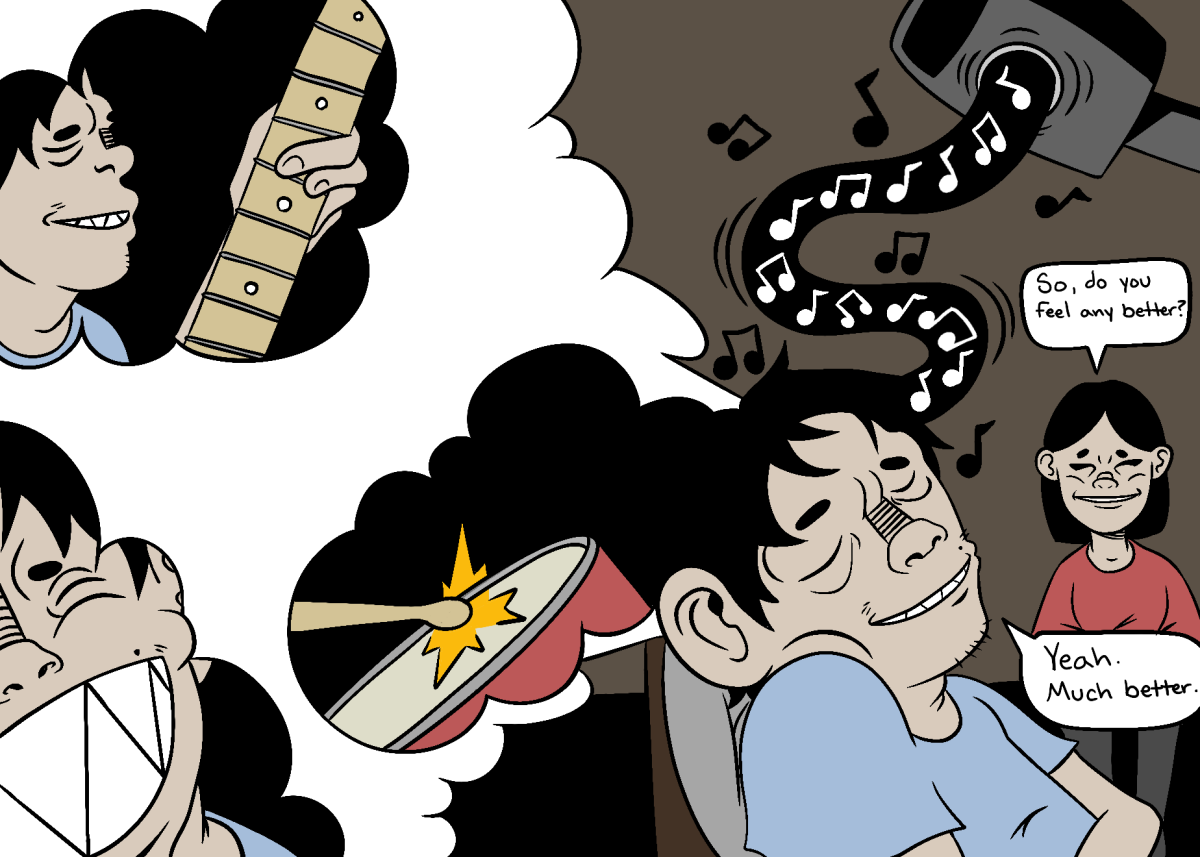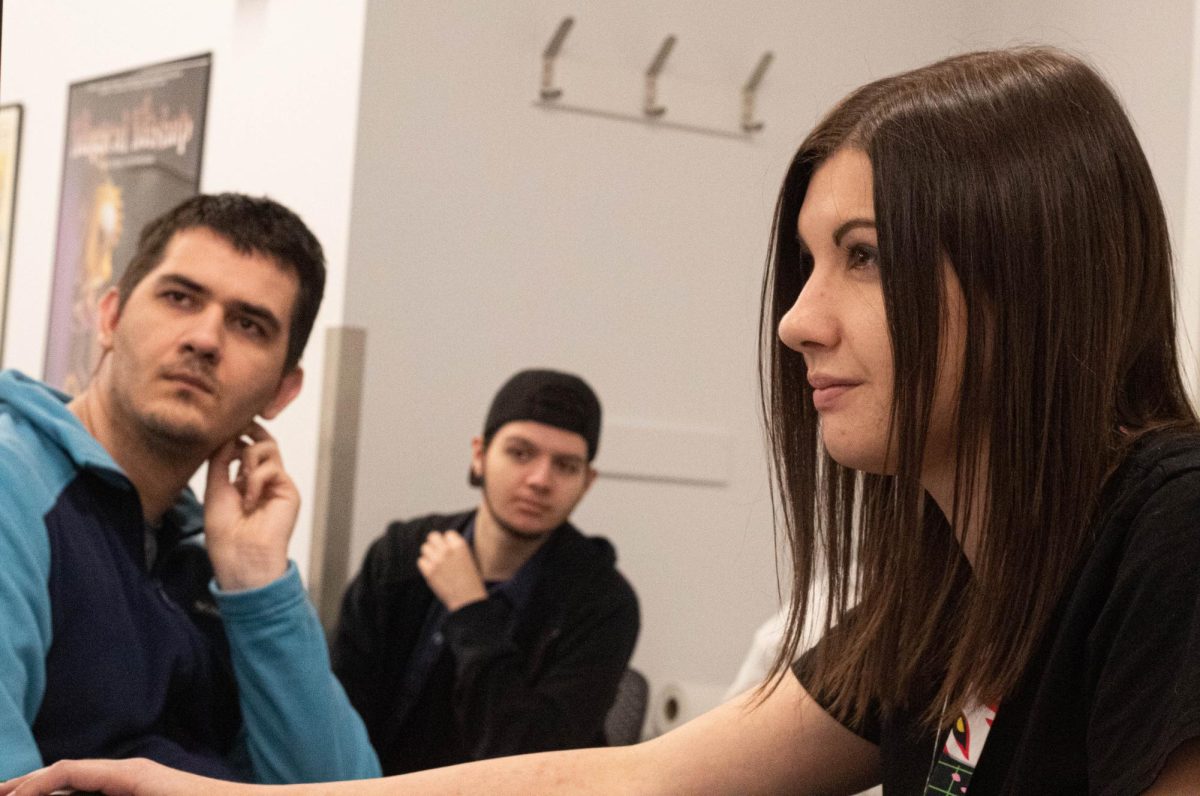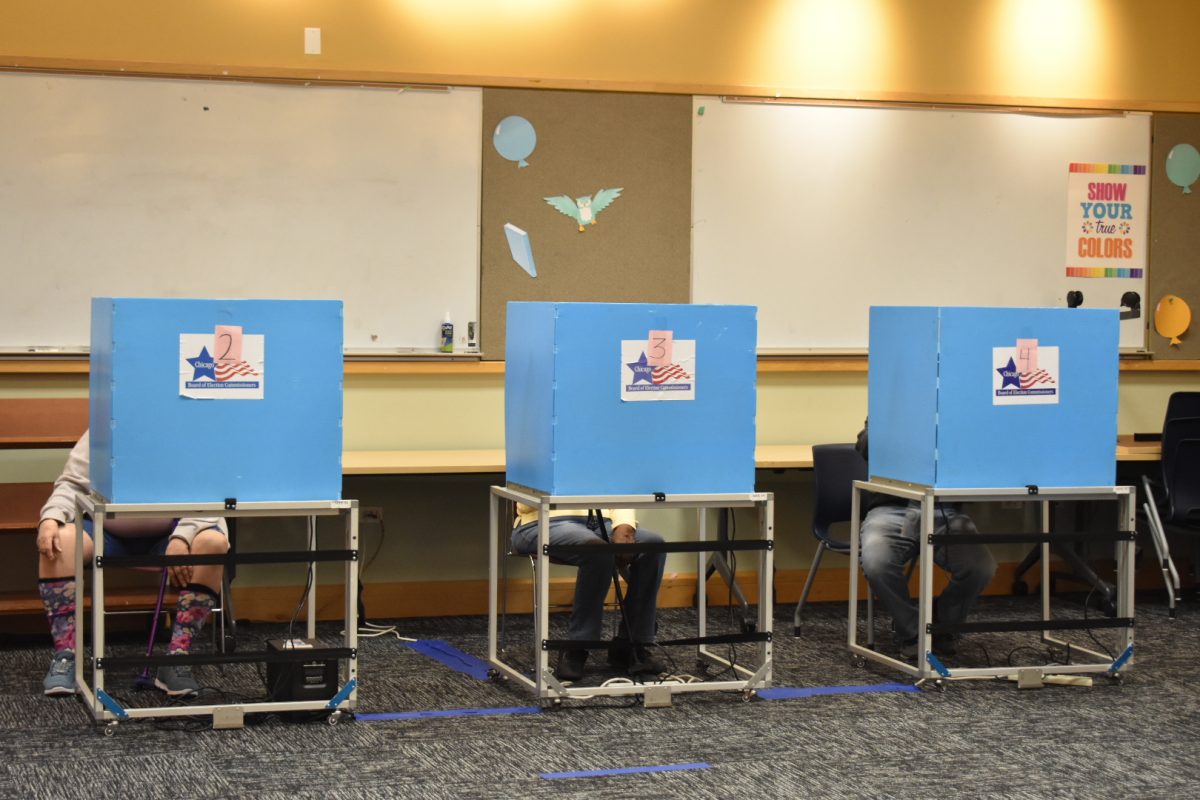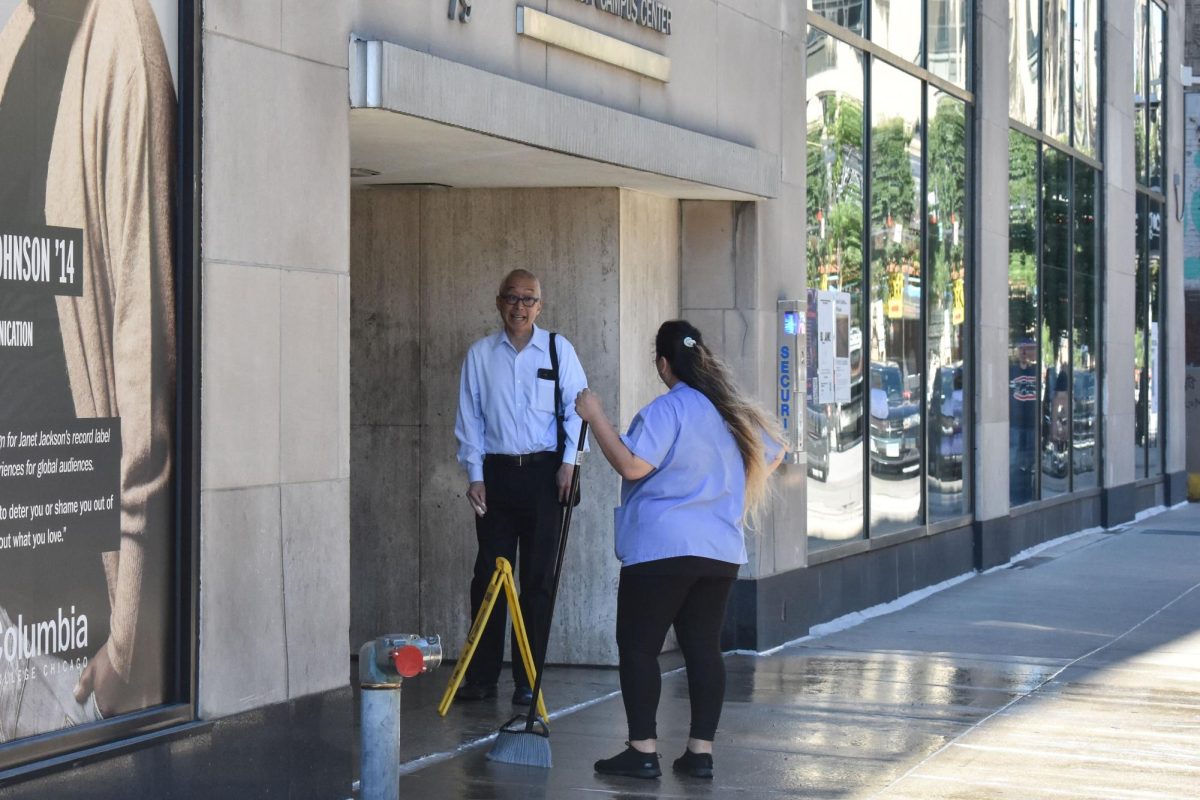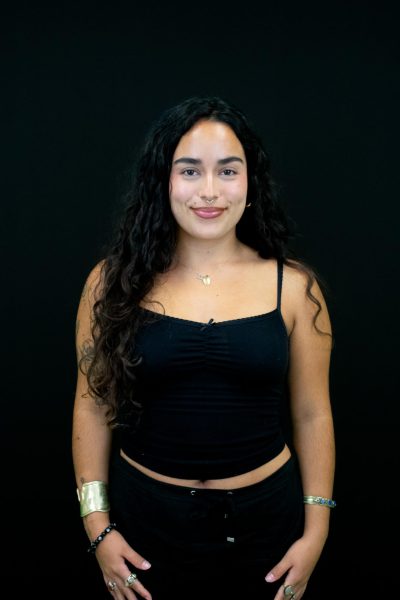MENTAL HEALTH ISSUE
The bookshelves at the 18th Street Casa de Cultura are filled with colorful books in Spanish and English. People file into the space, where they snack on cookies and popcorn, examine the tote bags, posters and artist-made shirts laid out on a table and stop by the build-your-own bouquet station.
Casa De Cultura, located in Pilsen, regularly offers community programs and art events. Today, everyone who arrives is given a small notebook with a Sin Título sticker on the cover and a pen, perfect for journaling.
This is the second journaling event hosted by Sin Título. The first, “Self Love Journal Club,” attracted around a hundred people. This one, “Journaling with Poems,” was added due to popular demand.
Sin Título is a socially conscious clothing brand that was started in 2020 by three Latina sisters. It has since evolved into a multi-faceted brand that hosts mental health discussion panels and other events series focused on the same objectives that drive the brand: amplifying marginalized young voices and healing the Latinx community in Chicago.
“Journaling with Poems” is led by Sin Título’s CEO and co-founder Iraís Elizarraz. She introduces each journaling prompt with a poem that requires self-reflection: Who you are, why you’re here and how you would define your sanctuary. Afterward, participants talk about how they didn’t expect such a deep self-introspection on a Friday afternoon.
Nancy Gallegos, a frequent attendee at Sin Título’s events, recalls the beginnings of the brand. Her parents live across the street from the Elizarraz’s house, where the sisters began by hosting events in their front yard.
“I think their whole approach is so different because it is very community-centered,” Gallegos said. “You walk into these already feeling a connection because you know people are there for the same reason as you. Not only are they creating a community, but they’re also healing a community. It’s very beautiful.”
Gallegos is already looking forward to the Sin Título’s Mother’s Day event, where she plans to bring her 15-year-old daughter and her mother.
Sin Título began at a pivotal point in society when the Black Lives Matter movement was forcing a racial reckoning. Iraís Elizarraz and her sisters, Itzel and Diana, created the company as a platform where they could speak without speaking through shirts and other apparel.
Some of their early tie-dyed or bleached t-shirts and hoodies feature slogans like “defund the police,” “I am my ancestors’ greatest dreams,” “ponte las pilas” – which means “get your act together” – and “got non-gentrified Mexican food?”
After COVID-19 restrictions were lifted, they decided to host events such as loteria game nights and “build your own t-shirt” opportunities. In 2022, sensing the need among young people, they started monthly mental health discussions.
“We wanted to find a sense of a relationship with our consumers beyond just purchasing a shirt,” Iraís Elizarraz said.
Iraís Elizarraz was inspired to host their monthly mental health discussions after being invited by Coffee, Hip-Hop and Mental Health to be a part of a mental health panel discussion at Thalia Hall, where she talked how she needed to create an Americanized version of her name to help people pronounce it.
“A lot of individuals came up to me and said, ‘I resonated with the dynamic that you mentioned,’” she said. “I wanted to have that feeling more and I wanted to have an outlet to speak on things revolving around mental health.”
Their monthly, themed mental health discussions began in May 2022. Smaller, pop-up events are held at spaces such as Kimball Art Center and See You Soon, but the larger ones are hosted at 18th Street Casa de Cultura.
Iraís Elizarraz said having their own business allows the creative freedom and the ability to go in any direction they desire, within reason.
“At some points we were doing too many things and we had to scale back in terms of logistics and of our sanity,” she said. “[My sisters and I] have full-time career jobs and try to juggle the two, having the free will to go in whatever direction, can be a blessing and a curse.”
For mental health discussion-based events, they partner with therapy professionals, including For Real Therapy, Latinx Talk Therapy and Encuéntrate. They curate the discussion theme to be aligned with the month. For example, December was “Mental Health Around the Holidays,” February was “Self-Love,” October was “Grief” and January addressed seasonal depression.
Events typically begin with the panelists or speakers sharing their stories and insights, followed by a Q&A session. Attendees are welcome to speak or anonymously submit questions directly that Iraís Elizarraz will ask on their behalf.
Storytelling is a big aspect of these events. Being able to share something personal with a room full of people can be difficult, but these events are supportive. Sometimes, people clap or laugh, but often, they are just silent.
“In mental health discussions, the most powerful reaction, for the most part, is silence and the sense of how people tilt their head and are really engaged in the conversation and in the words that are coming out of literally my soul to an extent,” Iraís Elizarraz said.
Ané M. Maríñez-Lora, a research assistant professor at the University of Chicago, who focuses on the cultural adaptation of evidence-based interventions in mental health services, said events like these can be very beneficial to young people, including college students.
“It’s very important for young people to be able to feel like they are in a supportive environment and that if they are having an off day that there is support there without shaming,” Maríñez-Lora said.
All events are held in-person, with no option of chiming in via Zoom. People have requested that the discussions be available online to reach a wider audience, but the sisters have no plans to provide that option.
“We don’t have the technology or can invest in equipment to really make sure that [the sound] is crisp,” Iraís Elizarraz said. “We also don’t want to disrupt it [by] juggling too many things; if we have technical issues, that means everyone’s experience who is in person is altered.”
Instead, she says, “I want to focus on mastering in-person and then we’ll explore that option of possibly doing virtual.”
Sin Título’s is expanding beyond Chicago, holding a discussion about the relationship with money in Dallas and a hiking trip in Los Angeles.
Events used to be free, with online signup, but now Sin Título charges a small admission fee of $2.50 to encourage people to come. This also helps ensure enough chairs and tables for guests—something that helps people feel more welcome.
“Some people come alone, and it’s something that’s very vulnerable for individuals that are stepping into their journey in mental health,” Iraís Elizarraz said. “We want to make sure that we’re attending to those small details that go beyond the typical event checklist.”
Sin Título’s Instagram feed extends the mental health journey online. Iraís Elizarraz uses Instagram to address her relationship with money and her struggles balancing work for corporate America with her own business. Many people grow up with money traumas, which negatively skew their perspective on working; a lack of resources and information available adds to that stress.
“I feel like that’s another outlet to let people into my personal mental health journey of what I’m willing to share with our customer base,” she said.
Sin Título also hosted a “Mental Wealth” panel discussion with Pablo Torres from Pablo Wealth Talks and Daisy Gomez, a Latina therapist and life coach.
Sin Título has begun embedding Spanglish and allows guests to speak in Spanish fully.
“People show up in different aspects of proficiency in Spanish, so we try to keep that in the back of our mind and [ask ourselves] how do we address this? That is something that differentiates us when we’re looking at our specific Latinx community,” Iraís Elizarraz said.
Gallegos said they are a fan of Sin Título’s shift to bilingual accessibility.
“I love that Iraís and her sisters are moving into this bilingual format and that I’m seeing a lot of Latinos in this community because we need to talk more about this and normalize these conversations,” Gallegos said.
Since the implementation of mental health conversations in their brand, Iraís Elizarraz says other small businesses have reached out for insight into how they can do something similar.
“I love that aspect that people are normalizing the conversation, we’ve influenced individuals who reach out to us saying ‘Hey, I live in Washington, we don’t have any of this, can we have a Zoom call and chat about how you work and how you started up?’” Iraís Elizarraz said. “A lot of it is just people having to see that it exists, they need to see that it’s possible.”
Copy edited by Lily Thomas.
Spanish Digest:
Sin Título está sanando a la comunidad latine, escuchando las voces jóvenes en Chicago. La organización fue fundada en 2020 por tres hermanas latinas quienes se asocian con profesionales de la terapia, como For Real Therapy y Latinx Talk Therapy, para organizar paneles de discusión sobre la salud mental y otras series de eventos en 18th Street Casa de Cultura, localizado en Pilsen. Estos eventos mensuales albergan una variedad de temas, como noches de poesía y narración de cuentos, abiertos a todos los niveles de hispanohablantes. Un aspecto importante de estas charlas sobre salud mental es ofrecer un espacio para que las personas expresen sus sentimientos.
Resumen en Español por Lizeth Medina


